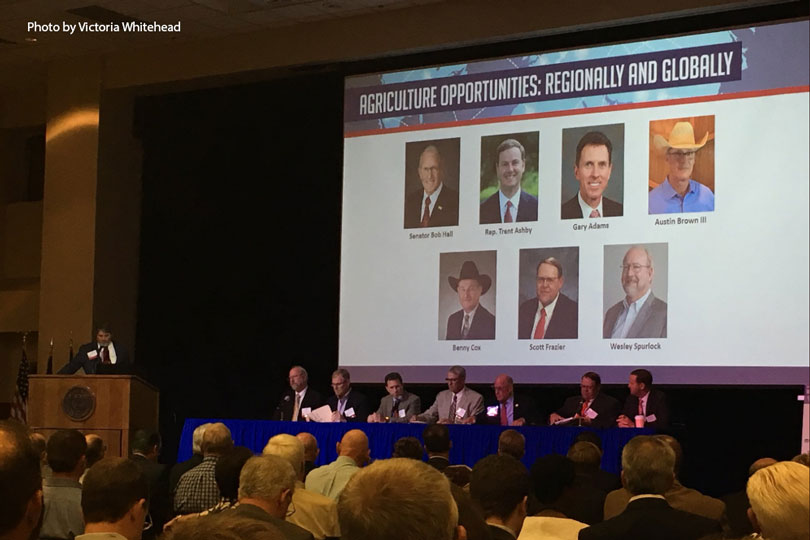By Julie Tomascik
Editor
Trade and its impact on agriculture, energy and transportation was the focus of the West Texas Legislative Summit.
The annual event provided the opportunity for agricultural representatives, elected officials and energy and transportation leaders to discuss current trade negotiations, including the U.S.-Mexico-Canada Agreement (USMCA).
“USMCA is important for agriculture, businesses, energy and transportation in Texas,” Scott Frazier, Texas Farm Bureau (TFB) vice president, said. “Trade agreements, specifically USMCA, directly impact our state’s economy, our farmers and ranchers and all Texans.”
Frazier participated in a panel discussion on regional and global agricultural opportunities during the summit.
Ratifying USMCA, Frazier said, would be a major economic win for the Lone Star State.
“Canada and Mexico are our two most important trading partners,” he said, noting Texas exports more than any other state to Mexico and is second only behind Michigan for exports to Canada.
More than 950,000 Texas jobs are supported by trade with the North American countries. In 2018, Texas exported more than $137 billion worth of products to its North American partners, accounting for 43 percent of Texas’ total exports to the world.
Those numbers would grow with the implementation of USMCA, Frazier said.
“Trade agreements create certainty that sustained, long-term relations in markets across North America will remain in place,” Frazier said. “It would offer certainty that when farmers plant, they will be able to harvest without major price swings. And certainty has been in short supply recently.”
On the panel with Frazier were State Sen. Bob Hall, chairman of the Senate Agriculture Committee; State Rep. Trent Ashby; Gary Adams, National Cotton Council of America president/CEO; Wesley Spurlock, Texas Corn Producers Association president; Benny Cox, American Sheep Industry Association president; and Austin Brown III, executive committee member of the U.S. Meat Export Federation.
Agriculture is the state’s second largest industry, accounting for about 9.1 percent of the Texas gross domestic product.
“Agriculture is a major economic driver in the state and the country, and the U.S. is the world’s largest agricultural exporter,” Frazier said.
Frazier noted the agreement will also enhance biotechnology standards, reduce trade distorting policies and establish modern sanitary and phytosanitary standards, among others.
“I’m not sure people realize the volume of trade we have with these countries and how much is funneled through Texas,” he said. “Passage of USMCA will help Texas farmers, ranchers, businesses and manufacturers.”
Now is the time to act, Frazier and the other panelists noted.
“Contact your congressional leaders. Explain to them the value of USMCA to Texas and the U.S. and urge them to ratify the agreement as quickly as possible,” Frazier said.
The West Texas Legislative Summit was held Aug. 7-8 in San Angelo.
Earlier this week, Frazier also participated in a roundtable discussion on trade in San Antonio with Ambassador Gregg Doud, chief agricultural negotiator of the Office of the U.S. Trade Representative; U.S. Rep. Henry Cuellar; and other agricultural and Texas business leaders from the San Antonio area.

